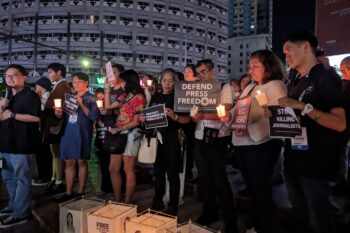GENERAL SANTOS CITY (MindaNews/26 January) — South Cotabato’s mining and quarry revenues dropped by around P1.25 million last year as officials noted a slowdown in small-scale mining operations in the area.
Siegfred Flaviano, South Cotabato Provincial Environment Management Office (PEMO), said Monday they only collected a total of P10.9 million in mining as well as sand and gravel taxes from January to December 2014 within the province’s 10 towns and lone city.
He said such figure was P1.1 million below their P12 million collection target last year that was set based on their total revenues of P12.15 million in 2013.
Flaviano said the province’s share in the mining and quarry tax collection amounted to P4.6 million while the rest was shared by the city and municipal governments.
The provincial imposition under mining and quarry covers sand and gravel tax; mining tax; mining permit fee; ore transport fee; occupational mining tax; verification fee; filing fee; permit fee; projection fee; processing fee; fines/penalties/surcharges; and, miscellaneous (delivery receipts).
The official attributed the drop in mining and quarry revenues to the significant reduction of the number of small-scale mining operators in T’boli town last year.
He said their records showed that out of the 184 tunnel operators recorded in the gold-rush areas of Barangays Kematu and Desawo in 2013, only 94 have remained last year.
“The total number of small-scale mining operators has greatly reduced because of our enforcement activities on errant tunnel owners and operators in T’boli,” he said in a statement.
Flaviano said they recommended to the Provincial Mining Regulatory Board (PMRB) the closure of a number of mine tunnels for violations of standards and regulations.
He said they also continued with the crackdown last year against mine tunnel and ball mill operators that lacked proper permits and licenses from the provincial and municipal governments.
The provincial government issued the closure orders in compliance with a directive from the Provincial Mining Regulatory Board and the provisions of Provincial Ordinance No. 7, series of 2003.
Ordinance No. 7 specifically sets the “taxes, fees, charges and other impositions on small-scale mining, mineral processing operations and transporting of mineral ore within the province of South Cotabato.”
Aside from this, PEMO personnel facilitated the closure of around 100 small-scale mining operations, mostly illegal, in the mountains of Tampakan town.
Flaviano said these included the illegal “banlas” or sluice mining operations, which was mainly centered in Sitio Kampo Kilot of Barangay Pulabato.
Banlas mining, which is considered a highly-destructive mining method, involves the pouring of large amounts of water using high-pressure water jets on a mountain’s surface to extract the rocks containing the gold ore, and then pan them with mercury.
The use of the illegal mining method was first uncovered in T’boli, and eventually reached the small-scale mining areas of Tampakan.
The province’s mining and quarry tax collections posted a steady increase from 2010 to 2012 before absorbing a P3 million drop in 2013.
In 2010, the province posted a total collection P406,834.05 and it increased to P3,518,287 in 2011. It reached an all-time high of P 15,790,315.30 in 2012.
Despite the drop in quarry and mining revenues last year, the Department of Environment and Natural Resources’ Mines and Geosciences Bureau in Region 12 said the province has remained the top earner in terms of mining and quarry taxes among local government units in the region. (MindaNews)
